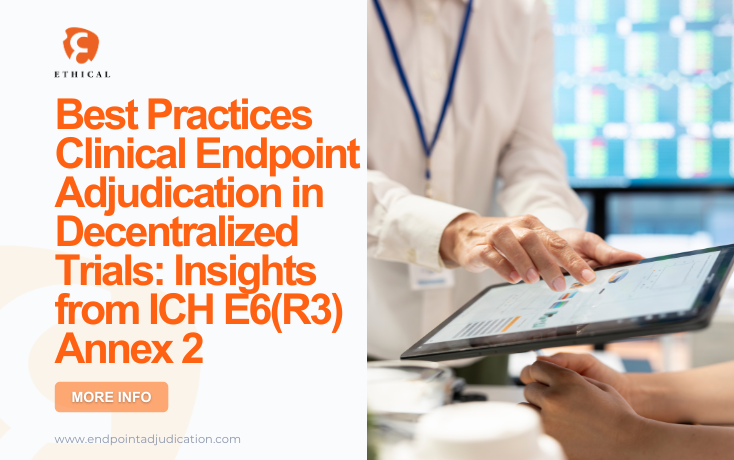Clinical development is rapidly evolving, and decentralized trials (DCTs) are at the forefront of this transformation. With the integration of digital health technologies (DHTs), remote data collection, and other digital health technologies, clinical endpoint adjudication faces new challenges and opportunities to evolve. The ICH E6(R3) Annex 2 provides crucial guidance on good clinical practices (GCP) for trials incorporating decentralized elements.
To ensure consistency, accuracy, and regulatory compliance in endpoint adjudication within DCTs, sponsors and investigators must adopt best practices in three key areas: pre-specified adjudication criteria, centralized blinded adjudication, and robust data validation processes.
1. Establish Clear, Pre-Specified Endpoint Adjudication Criteria
One of the primary concerns in decentralized trials is the variability in data sources used for endpoint adjudication. Unlike traditional trials where endpoint assessments occur at a central site, DCTs rely on wearables, telemedicine, remote monitoring, and electronic health records (EHRs) to capture critical data. This diversity requires clearly defined and pre-specified adjudication criteria to maintain consistency and objectivity.
Key Best Practices:
- Protocol-Level Adjudication Criteria: The clinical trial protocol should clearly define the endpoints and specify how adjudicators will handle decentralized data sources such as patient-reported outcomes (PROs) and remote imaging.
- Standardized Endpoint Definitions: Harmonizing endpoint definitions across all trial sites—including digital and in-person assessments—ensures consistency in clinical outcome evaluations.
- Handling Missing or Inconsistent Data: Establishing pre-specified rules for managing missing data, data delays, and inconsistencies from decentralized sources (e.g., wearables not syncing) can prevent bias in adjudication.
- Integration with Real-World Data (RWD): When using RWD for endpoint assessment, sponsors should consider ICH E6(R3) guidelines on secondary data use and ensure that the data is reliable and relevant for regulatory decision-making.
By embedding structured adjudication rules in the study protocol and aligning them with regulatory expectations, sponsors can facilitate consistent and defensible endpoint adjudications in DCTs.
2. Ensure Blinded, Centralized Endpoint Adjudication
Blinding and centralization are critical for minimizing bias and variability in endpoint adjudication. In DCTs, where data collection occurs in diverse settings (e.g., home-based assessments, local healthcare facilities), adjudication committees must ensure that endpoint assessments are independent, standardized, and unbiased.
Key Best Practices:
- Centralized Adjudication Committees: Establish a core, independent endpoint adjudication committee (EAC) to evaluate clinical outcomes separately from trial investigators.
- Blinded Review Processes: Implement a secure, digital adjudication platform where adjudicators assess endpoints without access to patient identifiers or trial location details.
- Digital Endpoint Review Tools: Utilizing AI-driven analytics and cloud-based adjudication platforms can enhance efficiency while maintaining a structured and blinded review process.
- Standardized Training for Adjudicators: Ensuring adjudicators receive consistent training on decentralized trial endpoints (e.g., wearable-derived biomarkers) helps minimize interpretation discrepancies.
Centralizing adjudication strengthens the integrity of endpoint assessments in decentralized settings and ensures alignment with ICH E6(R3) regulatory expectations.
3. Implement Data Quality Controls and Validation
With DCTs relying on diverse digital data sources, maintaining high data quality is crucial for regulatory approval. ICH E6(R3) Annex 2 emphasizes the importance of using a Quality by Design (QbD) approach to ensure that endpoint adjudication is based on reliable and validated data.
Key Best Practices:
- Data Validation Pipelines: Implement automated data quality checks to flag incomplete, inconsistent, or out-of-range endpoint data from remote monitoring tools and digital health devices.
- Regulatory-Compliant Data Integration: Use interoperability standards like FHIR and CDISC to harmonize EHRs, DHTs, and clinical trial data for endpoint adjudication.
- Cybersecurity and Privacy Protection: Protect patient data collected through remote devices and telemedicine by enforcing strict data encryption, access controls, and GDPR/HIPAA compliance.
- Handling Bias in Digital Biomarkers: Since wearable and sensor-based endpoints may differ across devices and patient populations, adjudication teams should establish device calibration and validation protocols.
A robust data validation framework ensures that clinical endpoint adjudication in decentralized trials meets regulatory expectations while maintaining scientific rigor and patient safety.
Final Thoughts
Decentralized trials are reshaping clinical research, but their success depends on rigorous endpoint adjudication practices. By implementing pre-specified adjudication criteria, centralized blinded review, and strong data validation controls, sponsors can enhance data credibility, minimize bias, and align with regulatory requirements outlined in ICH E6(R3) Annex 2.
With the right strategies, decentralized trials can deliver high-quality, reliable clinical evidence, paving the way for more efficient, patient-centric drug development.
Interested in optimizing your endpoint adjudication process? Contact Ethical by filling out the form below to learn how we can support your decentralized trial needs!




